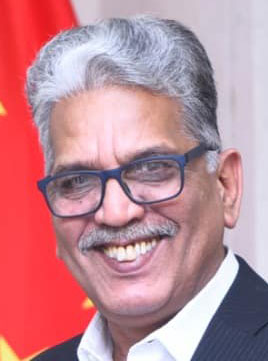Since the evolution of human race on earth, man has confronted many natural and unnatural calamites which have hindered the overall development and hampered the progress of him.Since ages, such natural and anthropogenic causes have led man’s very being at jeopardy. The emergence of COVID-19 is not a newphenomenon in human history. Back to the recent pandemic, there have been many epidemics which resulted in human catastrophe at greater extent. Those viral diseases include Spanish Flu, Plague, Ebola virus, etc. The spectrum of those pandemics was wide and ever increasing. However, the recent 3rd wave of COVID-19 has proved more fatal and lethal, devastating and disturbing which Henry Kissinger said, “society dissolving effects”.
Certainly, he current wave of this invisible and implacable enemy has put forth serious implications to the existent social fabric. These are perilous times, the number of positive declared patients of COVID-19 is soaring high, hospitals are drained with serious patients, technology is failed and the complete health system is in shatters. Arms and ammunition worth billions of dollars are of no use in front of a tiniest and an unseen human foe. The micro-organism has put serious questions on the technological advancement in 21st century.
The virus has both horrible and horrendous impacts on human progress and privilege. When all other fields and dimensions are severely affected by this novel virus then howwould the system of education be left behind. Schools and universities are closed in the wake of 3rd wave for these institutions are a major meeting points where the hundreds of thousands of students and teachers come across and encounter each other. These have been the major centers of man’s socialization from the length and breadth of a country.
Nevertheless, despite the dark and dwindling scenario, the modern science and technology seems the only option to throw away the cobweb of such fatal disease. [Obviously in compulsion, not as an option.] The recently closed universities and other academic centres have gone for launching online teaching as an alternative mode to the traditional method of teaching learningthat could best suit the growing needs and demands for running the educational institutions.
Verily, the developing countries like Pakistan have had to clinch to the online education in order to compensate the loss of academics and research in the wake of recent wave of COVID-19. Pakistan is enlisted among those countries which are far away from the net of modern science and technology. But despite that, it has come up with the adaptation of online education to its pupils. This step, though encompassing many flaws, has set country on the right track. The need for unstoppable and continuous education is not compromised at all. This is a positive move in its entirety.
Fortunately, Higher Education Commission in Pakistan has opted for running the universities via online classes inclusively. The initiative engulfs many needs and requirements. The pre-existing means and modes of technology in a country like Pakistan are not as much up to the mark. There already exists socio-economic disparity and the feelings is so high in the field of education. There prevails educational apartheid in private vs. public schools. The socio-economic fabric of country furthers the gap between bourgeois and proletariat class when it comes to online teaching and learning.
Well-to-do class could afford electric gadgets like computers, laptops, android cellphones, smart watches, tablets etc., while those who are penny less and on empty pockets; for them, it is quite hard to meet novel expenses of academic journey of their children. The downtrodden class has further suffered from the pandemic as their only source of income is halted due to strict and stringed smart and full-scale lockdowns. Those who earned their bread and butter by day-to-day hard work and labor, have suffered much at the hands of government’s strict policies of curbing the menace of pandemic. For these, church mouses online education is another cut on their already shattered pockets.
Keeping in view the grim and gruesome situation of COVID-19, there seems no viable option than to start online classes in order to continue imparting education to the students. As the world has underwent a perilous problem of shut downs of business hubs, lockdowns in cities, and closing downs of universities and schools, it is obvious that this mystery could not be fathomed in a jiff. Succinctly, the undercurrent of anxiety has more challenges to bring fold to the field of education. As the world is moving towards online classes, there have emerged a serious debate and discussion on what essentially are the requirements of e-learning.
The discussion manifolds a series of needs and necessities that ought to be met and done away with. That includes a strong monitoring and evaluation system, providing guidance on quality enhancement, building a data repository system, curating online materials, arranging software and connectivity packages and keeping checks and balance on online learning.
Consequently, the students in every nook and corner of country have been compelled to go with very novel system of education never practiced in the majority of public universities of Pakistan except Allama Iqbal Open University and some others. Without proper facilities and feasibilities this would be an adventurous move and nothing else. More than 50% of Pakistani students don’t have access to internet, almost 90% of students form Balochistan, ex-FATA, and Gilgit-Baltistan are devoid of such basic necessity in 21st century. Sindh being the most urbanized province of Pakistan, lacks behind technologically advanced education system. Therefore, the feasibility for running online classes is not an easy task at all. It demands reliable technological and technical setup for smooth functioning of virtual classes.
Moreover, online education comprises six key elements for “online ready”, which includes university readiness, course readiness, library readiness, faculty readiness, technology readiness, students’ readiness. Unless the aforementioned requirements are meet up, the system will not function accurately. There is an interconnectivity between the things that are ought to be dealt accordingly in order to go without any break and delay for web learning.
Simultaneously, as the concept of online education is new in Pakistan, so students are very much hesitant of this novel idea. They are both anxious and perplexed. They face too many problems while taking online classes. The major one is an issue of adaptability. Students are not familiar of the usage of different apps like zoom, google mate, click meeting, join me, sisko, zooho meeting etc. They encounter technical issues as well. Previously, the majority of student’s usage of electrical gadgets was confined only to YouTube and google search engine. Now as the demand has arisen, they have to gather technical information in order to run that complicated-cum-boring software. Besides this, students from public institutions are not well-aware of the usage of computers, they lack basic knowledge of computers which hampers their learning capability at all. At the same time, time management is a also a big issue for students, as they are not habitual of taking classes at home.
There are many distractions that attract them and ultimately, they lose interest in classes and involve in multi-tasking. In online classes, students’ loss self-motivation as well. They have no teacher physically available who could motivate them with his gestures and facial expressions. On the next level, students feel anxious and lazy in virtual engagement as there is no presence of a teacher at home who could monitor and check them. This too minimizes their interest in their scheduled classes. Internet problems, light fallouts, cellphone impairment, noise and unfavorable condition at home are other examples in stance. Getting a feedback from teachers is also a problem because assessment in physical classes has no match with online ones.
Similarly, teachers too have to go with many issues while putting online education into place. They find it very difficult to engage students via online classes as it is too cumbersome to manage students virtually. Additionally, teaching faculty too has to deal with internet problems and technical issues specially when they take classes from home or apart. Assessing students’ performance and giving them feedback is another problem faced by a teacher while imparting online education. Lack of proper training and teaching methodology is another serious trouble for a teacher.
Among all, the fear of cheating soars high in online education as students are vulnerable to such academic theft in virtual learning. This and many others are the major complications that a teacher faces while teaching via modern tools of e-learning.
Having discussing the hindering factors of online education process, lets peep into and appreciate the initiative taken by HEC last year. After emergence of COVID-19,HEC introduced a comprehensive plan for online learning to cope with the current exigency. Keeping in view the deteriorated ongoing situation, it approved a 4-point programme to address the core issue of connectivity. It stressed on a need for “Taleem Bundle” so that the children from lower class families could attain and get maximum benefit from ongoing online education.It required university administration to bring about a change in delivery modes and to revitalize the traditional teaching methodology. Teachers were required to teach students through power point presentations, audio video recordings and pictorial charts and diagrams.
Furthermore,the programme stressed on the need for the offline mode availability of lectures, notes and recordings of the class. This could provide students of all categories and from all strata of society an all-time access to study material without any connectivity issues. It also ordered universities to formulate students’ facilitation committee so that students could get their issues resolved through proper channel at proper forum.
Without a doubt, Pakistan is not technologically an advanced country, it has a long way to go. And this is not just about imparting education to the young minds, it has also a direct link with sociopolitical lacking. Provinces with meagre or almost zero technical advancement cannot develop an environment conducive to an alien system of education, unless the decisive efforts are taken at gross-roots level. Government should take prompt measures in order to provide basic facilities to all the units of federation.
Conclusively, in these uncertain times, as the advantages outweigh the disadvantages of online education; therefore, no stone should be left unturned in order to make arrangements for proper implementation of virtual classes.It has that potential that could make a room for more academic progress at all possible grounds.The spectrum of online education is so high and wide that it could encircle larger number of pupils that rather seems impossible in a conventional method of education.Therefore, a midnight oil must be burnt because this is an only option left in a fearsome and fatal wake of pandemic. We need to take a new start as a nation, as we owe this to our future generations.
Sign in
Welcome! Log into your account
Forgot your password? Get help
Password recovery
Recover your password
A password will be e-mailed to you.







